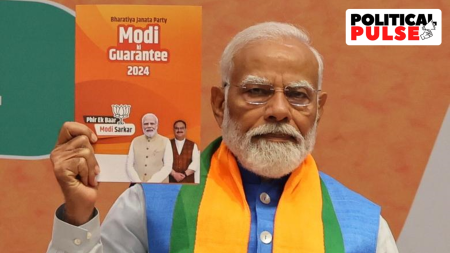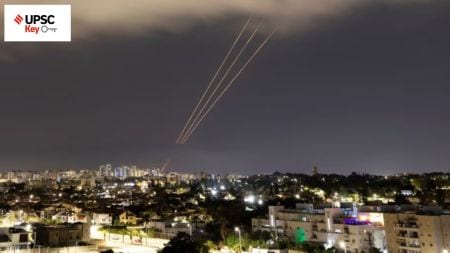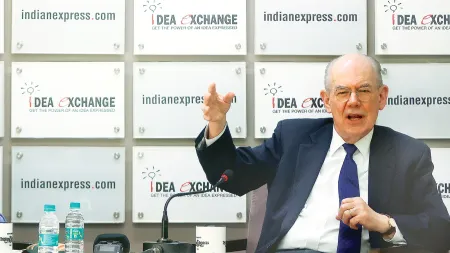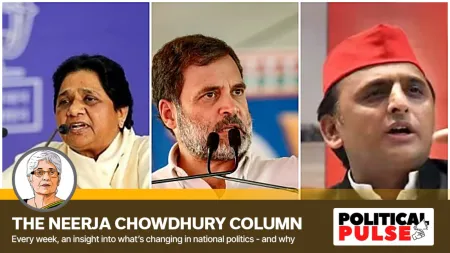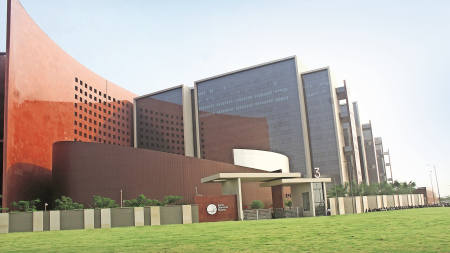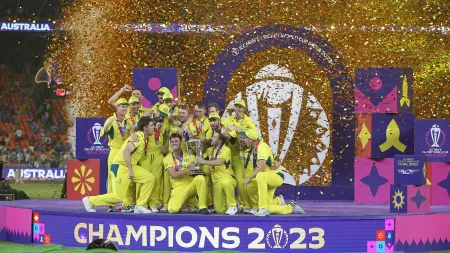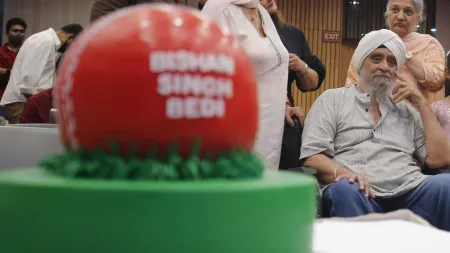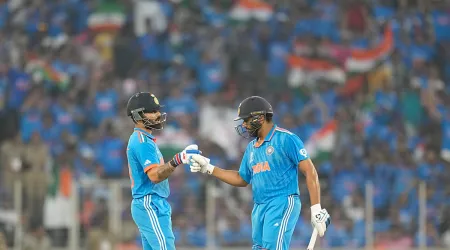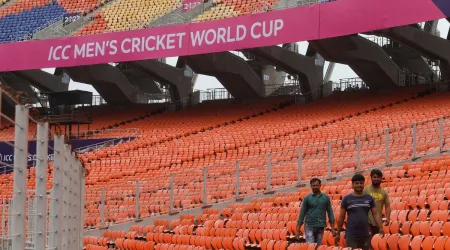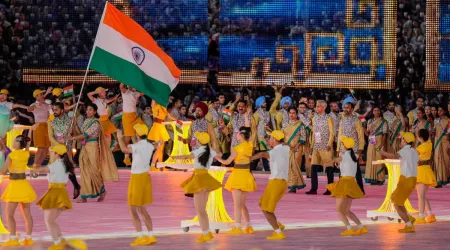- India
- International
Asian Wrestling Championships: Sunil Kumar ends 27-year wait for Asian Greco-Roman gold
Wrestlers’ aura prompted Sunil’s father to put his son into the sport, a decision vindicated more than a decade later
 Sunil Kumar beat Azat Salidinov of Kyrgyzstan 5-0 in the 87kg Greco-Roman final to clinch gold at the Asian Wrestling Championships. (Express photo by Abhinav Saha)
Sunil Kumar beat Azat Salidinov of Kyrgyzstan 5-0 in the 87kg Greco-Roman final to clinch gold at the Asian Wrestling Championships. (Express photo by Abhinav Saha)
The story begins at a wedding reception, sometime in the late noughties.
Ashwini Kumar, a small-time farmer from Haryana’s Dabarpur village, was at a relative’s reception when he first came across wrestlers. Dabarpur, they say, had no wrestlers or even culture for the sport in a radius of 30-40km. It was at the function that Ashwini witnessed first-hand the aura wrestlers have and the respect they command, especially in Haryana.
At that moment, he decided to make one of his two sons a wrestler. “It was impossible that both of us would get into the sport. It’s expensive enough to take care of the dietary requirements of just one wrestler. For us, it was unaffordable to have two wrestlers in the family,” says Sumit Kumar, Ashwini’s elder son.
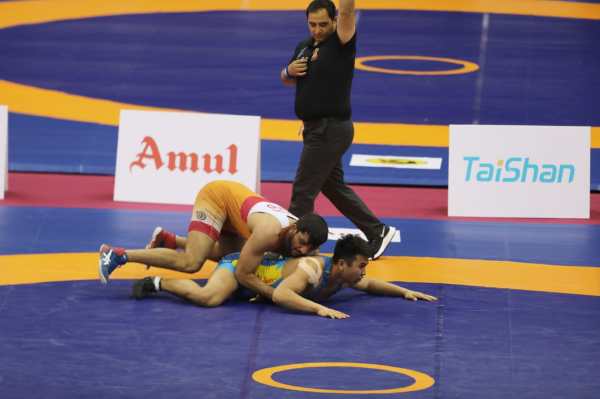 Sunil Kumar after winning Gold Medal in World Wrestling Championship, at India Gandhi International Stadium in New Delhi on Tuesday. (Express photo by Abhinav Saha)
Sunil Kumar after winning Gold Medal in World Wrestling Championship, at India Gandhi International Stadium in New Delhi on Tuesday. (Express photo by Abhinav Saha)
So, Ashwini came up with an idea. “He held a 5km race and laid down a condition: the one who would finish first would get wrestling training and the other will have to tend to the family’s farms,” Sumit says.
The elder brother lost the race to his muscular, quicker and eight-year- younger sibling. A little more than a decade later, after the most unusual initiation to the sport but following years of toil and training, Sunil – the younger brother – ended India’s 27-year wait for an Asian Championship gold medal in Greco-Roman, a wrestling style that’s ignored and an afterthought in the country.

Sunil, 20, wasn’t even born when India last won an Asian gold medal in Greco-Roman – in 1993, when Pappu Yadav won the 48kg class. But in all these years between Tuesday’s gold and the one before that, not much has changed in terms of India’s outlook towards this style. “During our time, Greco-Roman wrestlers were considered outcasts; failures in freestyle,” Yadav, who watched Sunil’s bouts from the stands at Delhi’s KD Jadhav Stadium, says. “That mindset hasn’t changed till today.”
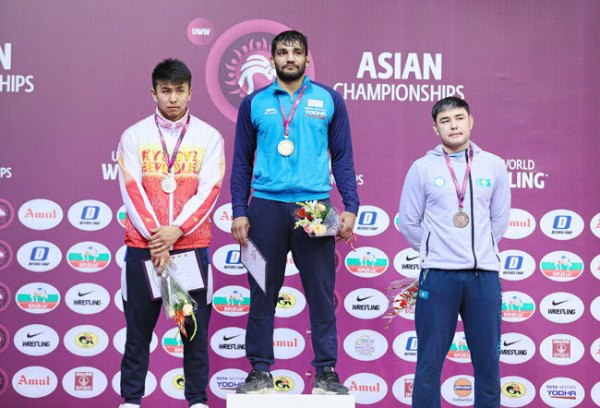 Sunil Kumar’s podium finish.
Sunil Kumar’s podium finish.
In Haryana’s endless swathes of mud pits and cushioned mats, Greco-Roman is not a priority. For some, the style in which holds below waists are not permitted isn’t intricate enough compared to freestyle while the majority doesn’t care because of India’s pitiful international record. And since dangals, a major source of income for wrestlers, have just freestyle wrestling, Greco-Roman never became popular.
Almost every Indian wrestler begins with freestyle as the first choice, and Sunil was no exception. After winning the ‘selection trial’ his father held, he began freestyle training at a sports school in Haryana’s Jind. But soon, the coaches realised his lower body did not have the strength to withstand the strong demands of freestyle wrestling, in which nearly every move begins with a leg hold.
Considered not strong enough for freestyle, Sunil was sent to Greco-Roman. “And it came naturally to him. What he lacked in legs, he made up with shoulders,” Sumit says, referring to his brother’s physical strength.
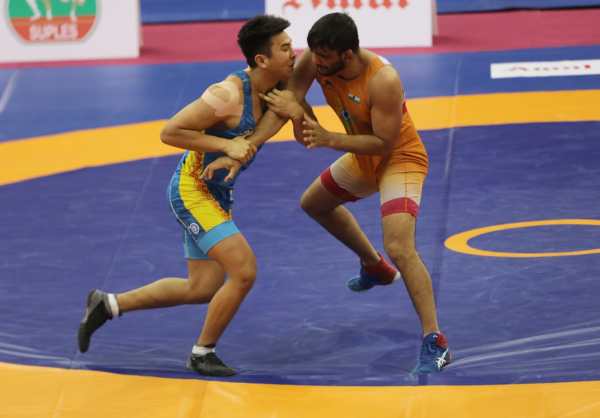 Sunil Kumar in action at India Gandhi International Stadium in New Delhi on Tuesday. (Express photo by Abhinav Saha)
Sunil Kumar in action at India Gandhi International Stadium in New Delhi on Tuesday. (Express photo by Abhinav Saha)
While Sunil’s move was out of compulsion, in the case of Arjun Halakurki – who won a bronze medal on Tuesday – the shift from freestyle to Greco-Roman was due to desperation. Like Sunil, Halakurki, too, came from a village with very little wrestling pedigree. The Bagalkot native took up the sport after being inspired by his father, a dangal wrestler. But it was freestyle that attracted Halakurki.
For a decade, he competed in freestyle events across India. But he wasn’t good enough to get into Karnataka’s state team. “It was very frustrating. My career was heading nowhere despite working so hard,” Halakurki says.
Hargobind Singh, India’s Greco-Roman coach, says Halakurki was not strong in leg attacks but instead, used his upper body to initiate moves. “It’s a style that would have suited him in Greco-Roman, so it was suggested that he shifts categories,” Hargobind says. 
The Asian Championship was Halakurki’s senior international debut. The inexperience cost him as he conceded a six-point advantage to lose to Iran’s Pouya Naserpour 8-7 in the semifinals of the 55kg category.
Sunil did the opposite. He gave ample evidence of his prowess during his 5-0 rout of Kyrgyzstan’s Azat Salidinov in a one-sided final in the 87kg class. But before that, he staged an improbable comeback in the semifinal, rallying from a six-point deficit to beat Kazakhstan’s Azamat Kustubayev 12-8.
The gold also means Sunil would be among the favourites for an Olympic berth in the continental qualifiers next month. “Our father wished for something bigger, we even dreamt of a medal at the Olympics,” Sumit says.
Sunil’s father passed away in a car accident when he was 10. But Sumit says it took years for Sunil to move on. On Tuesday, Sunil did not dwell on it much. He was surrounded by teammates, coaches and federation officials, everyone trying to be in his vicinity. “This aura and respect is what attracted our father to wrestling,” Sumit says. “This is just the beginning.”




